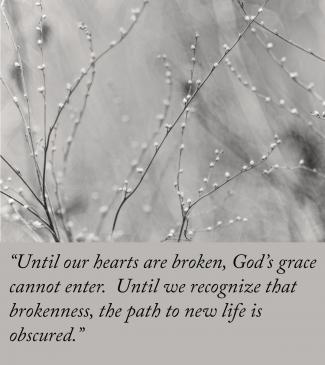For years I resisted admitting that my eyesight was slipping. Always I told myself that the light was bad, or I was just tired. I was unwilling to recognize this gradual function of nature because, honestly, I had spent a lifetime being quite proud of my eyesight: 20/20 in one eye, 20/15 in the other, the doctor had once told me. I felt quite superior! I could read the bottom line on the eye chart, the highway sign in the distance, the fine print on the product label.
Can you imagine anything more foolish than being proud of something over which one has no control whatsoever? It’s not like one’s eyesight represents an accomplishment! Still, pride describes exactly how I felt about my vision. Consequently, I refused to acknowledge a growing imperfection, and struggled for years. Eventually the solution proved simple. (Glasses!) But that is not always the case, for as long as we deny our need we cannot be healed. The denial of need prevents the possibility of healing.
This is the covenant that I will make with the people: I will put my law within them, and I will write it on their hearts; and I will be their God, and they shall be my people. [Jeremiah 31:31-34]
I once heard the gifted writer Madeleine L’Engle recount how a rabbi had been approached by his people and asked, “Rabbi, why is it that the prophet says that the law of the Lord will be written on our hearts? Should it not be in our hearts?” And the rabbi replied, “Perhaps it is because until our hearts have been broken, nothing is able truly to get in.”
Here is a deep truth. The most grace-filled people I know are apt to be people who, along the way, have had their hearts broken. Some have endured life-crippling illness. Some saw things in war that they never wanted to see, or left a piece of themselves at the beach in Anzio. Some have been abandoned in relationships, and some know that they themselves bear the guilt of abandonment. Some have known the death of a child, leaving a hole in the fabric of their lives that never fully mends. In so many of these stories, the broken heart of the one who grieves has opened up to become a bigger heart, a more grateful heart, a more compassionate and generous heart.
Our brokenness, of course, can come not only from exterior circumstance and tragedy. Sometimes that brokenness comes from our own interior frailty. My failure for so long to correct blurry vision is paralleled by other sorts of failure. Bad eyesight is scarcely the only thing we resist admitting. We may fail to see and acknowledge when our relationships are out of focus, or when our priorities have gone askew, or when some dimension of our life has gotten out of control. We may fail to see and acknowledge when–as individuals, as groups, or even as a nation–we have headed in a wrong direction.
And what is the consequence of this failure? It is, of course, that we cannot find healing. Until our hearts are broken, God’s grace cannot enter. Until we recognize that brokenness, the path to new life is obscured. Twelve Step programs which have been a channel of grace for so many begin with Step One–an acknowledgment of brokenness, of something which we, of our own power, cannot fix. And early on is Step Four, a “searching and fearless moral inventory of ourselves.” These principles apply not only to addictions, but to all the physical and spiritual ways in which we find ourselves in need of God’s strength.
“Very truly, I tell you, unless a grain of wheat falls into the earth and dies, it remains just a single grain; but if it dies, it bears much fruit.” [John 12:24] Jesus’ message encompasses the truth of the rabbi who said that the heart must break for God to enter fully. It encompasses also my own self-evident learning, that my foolish pride of eyesight had to die so that I could find the means to see clearly again. In ways both small and large, mundane and profound, Jesus’ utterance touches our lives.
There is something in every one of us that needs to be broken and die in order to open the way for healing and rebirth. Or perhaps it already has died, but needs yet to be acknowledged. If you and I haven’t figured out what that something is by Good Friday, then Easter will fail to be all that it can be. Let me say that again, framing it in the positive: There is something in every one of us that needs to die, or perhaps it already has. If I can come to a fuller acknowledgment of what that is during this season of Lent, then I can bring that brokenness to the cross in Holy Week, and embrace even more fully the glory of Easter.
Where is pride keeping your vision blurry? Where is your heart broken, or needing to break? I invite you to ponder these things in Lent, that after these forty days the cross and empty tomb might have their fullest way with you.
Faithfully and fondly,
+Alan
The Rt. Rev. Alan M. Gates
Image: "Hazel buds bw" by Chris Hawes is licensed under CC BY-NC-SA 2.0.

